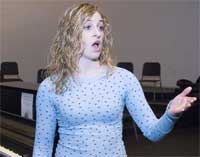But let’s get back to the music majors. While 65 percent major in music education, other students combine their love of music with such disciplines as business administration, computer science, psychology, communication, and film studies. Voice is the top choice for majors with 35 percent.
“I would not have come as far as I have vocally, if it wasn’t for my voice teacher Barbara Youmans,” says vocalist student Michelle Karn who is from North Smithfield. “She’s just wonderful and so supportive. The way she teaches is mainly by demonstration and she does such a good job at that.”
In addition to a strong faculty, varied programs, and 225 music courses, Ronald Lee, department chair, credits the enrollment increase to a strong recruiting program.
Lee said that 45 percent of students admitted to URI come with some music background, such as participation in high school band, chorus, or private lessons. The department sends the incoming freshmen information about the program and the various opportunities it offers to majors and non-majors.
Students interested in the program must take a mandatory entrance audition at one of the six audition days. Perspective students and their parents meet with current enthusiastic majors. In addition, some of the prospective students are given a free, private lesson by faculty members. 
“I did a little bit of research around the area before deciding where to attend school. I knew that I had to be in a place where I was comfortable,” explains flutist Allison Lacasse who is from New Bedford, Mass. “The faculty here really go above and beyond what they need to do. Since we spend time with them we get to know them well. There’s a lot of mutual respect. It’s a great community feel.”
Lee said that a new jazz study program has contributed to the increased popularity and ensembles also play a key role in attracting students. “A foremost goal of our music majors is to get into one of our ensembles, such as the wind ensemble, symphony orchestra, the concert choir, and if they are in the jazz program, one of the two big bands.” The increase in majors has led to the highest number of recitals in the department’s history, more than 40 are scheduled this academic year.
The Music Department has an ever-increasing outreach program that also could contribute to the increased enrollment. For example, this semester, the Department will host the New England Honors Band, the Rhode Island Music Educators Jazz Festival, the URI Jazz and World Music Festival, the Army National Guard Band, the Rhode Island Percussive Arts Society Festival, the Burriville High School Concert Band, the Piano Extravaganza Festival, the Steinway Piano sale, African drumming for music teachers, and the Mount Hope High School Concert Band. In addition, various outreach performances and lessons will be given by the URI Opera workshop and the URI Preparatory Program.
In addition, the popular summer music camp has evolved into three camps with different concentrations: string, jazz, and voice (opera) concentrations.
Students participate in the marching and athletic bands, which are co-sponsored by the Music Department and the Athletic Department. URI’s Athletic Band plays at the men and women’s basketball games, while the Marching Band plays at the home football games. “They lend quality excitement to the games,” Lee said.
The music program is becoming more competitive as more students become interested. For example, the number of students in flute classes, taught by Susan Thomas, may soon have to be capped. Thomas, the principle flutist for the Rhode Island Philharmonic, not only has an excellent reputation, but is also an excellent teacher, according to Lee. “We have all of these student flutists who want to come and study with her, but we only have so many slots.”
It is a challenge to keep the instrumental programs balanced. Lee said it is hard to get particular instruments into the program such as the oboe, bassoon, tuba, and string base, so the department heavily recruits nationally and regionally. He said: “If we could get more oboes, we’d love it.”
The department is known for its extensive portfolios, which students begin creating as freshmen and continue until they graduate. The portfolios, both hard copy and electronic, include a résumé, program of studies, videotapes, evaluations of work, best work in major and non-major courses, repertoire, concerts attended, and the students personal philosophy on music.
“It is basically a gigantic scrapbook of everything you have done since you stepped in the door the first day,” explains Lacasse. “It’s really a powerful piece of information.”
“You can go into an interview and say I’ve done this and these are the things that I have also done,” said Karn.
Recognizing these state-of-the-art portfolios, the National Association of Schools of Music has invited URI to its next annual meeting in November in Salt Lake City, Utah to lead a session on portfolios. Lee said: “We have a special program here that is unique to the country and we are one of the only schools doing portfolios to this extent, so we are going to do a show and tell.”
Pictured above
Michelle Karn (sining)
URI News Bureau Photo by Michael Salerno Photography
Allison Lacasse (flute)
Photo from Allison Lacassee

